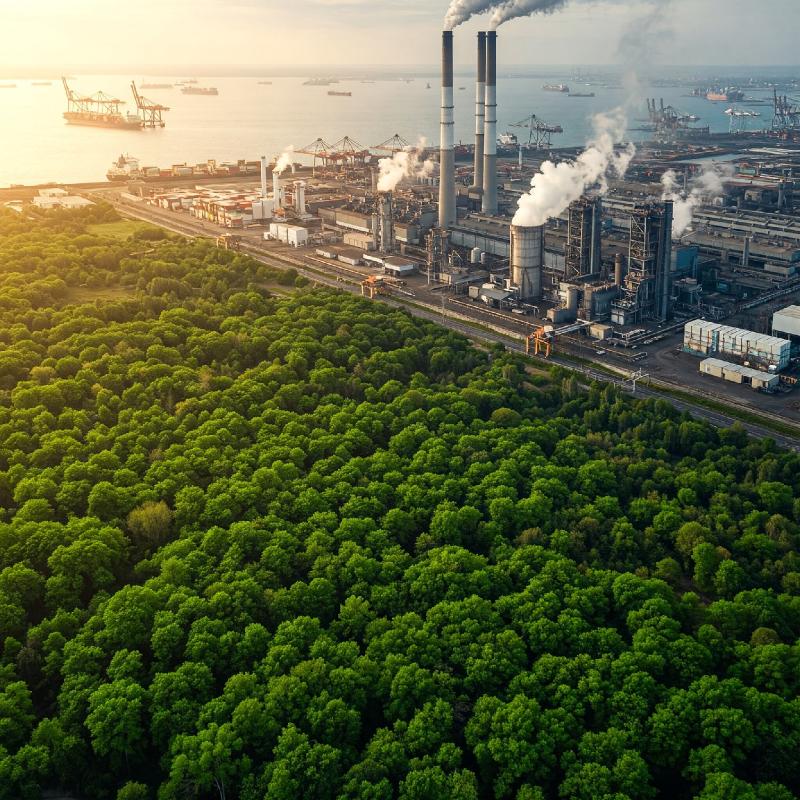
The Green Paradox: When Democrats Embrace Free Trade, Environmentalism Suffers


The Democratic Party, once a bastion of environmental advocacy, now finds itself caught in a perplexing paradox. While preaching the gospel of environmental sustainability, it simultaneously champions free trade policies that fuel the very consumption patterns threatening our planet. This dissonance isn't just a matter of political optics; it's a fundamental contradiction that demands scrutiny.
Remember "An Inconvenient Truth"? Al Gore's chilling documentary, a touchstone for the modern environmental movement, painted a stark picture of unchecked consumption and its devastating consequences. It galvanized a generation, injecting a moral urgency into the fight against climate change and environmental degradation. Yet, nearly two decades later, the party that embraced Gore's message is pushing for international trade practices that prioritize economic growth, often at the expense of environmental safeguards.
The core of the problem lies in the inherent tension between economic expansion and ecological preservation. Free trade, by its very nature, encourages the movement of goods across borders, often leading to increased production and consumption. This desire for more goods at lower cost overwhelms environmental safeguards to satisfy the need for natural resources. Democrats’ environmental concerns are too easily disregarded when economic concerns capture public attention.
Consider the plastic dilemma. While environmentalists rightly decry the proliferation of single-use plastics, the Democratic Party hesitates to impose meaningful import restrictions, citing concerns about economic disruption. The result? Cheap, disposable plastic packaging and products continue to flood our markets, choking landfills and polluting oceans, while the party pays lip service to sustainability.
This isn't just about plastic. It's about a broader pattern. The Democratic Party, once critical of neoliberal economic policies, now seems to have fully embraced them. The pursuit of trade-based growth, a relic of the Clinton era, remains a priority, even as the Republican Party, ironically, has shifted towards a more protectionist stance.
The consequences are clear. Public trust erodes when political rhetoric clashes with policy reality. The party's environmental pronouncements begin to sound like hollow platitudes, designed to appease eco-conscious voters while avoiding the hard choices necessary for genuine change.
How can Democrats reconcile these competing priorities? The answer lies in a fundamental shift in perspective. They must acknowledge the inherent limitations of a growth-at-all-costs economic model to garner public support. They must prioritize policies that promote sustainable consumption, even if it means sacrificing short-term economic and political gains.
This requires more than just green rhetoric. It demands concrete action:
- Trade agreements with teeth: Environmental standards must be integrated into trade deals, with enforceable trade barriers for non-compliance.
- Strengthening domestic manufacturing: Environmental safeguards work best when they can be applied directly to manufacturing within national borders.
- Investment in sustainable alternatives: The party must champion domestic manufacturing of eco-friendly products, creating green jobs and reducing reliance on polluting imports.
- Promoting local investment: Empowering local stakeholders with access to local investment capital ensures a better understanding of both economic needs and environmental impacts, fostering sustainable regional development.
- A circular economy: Policies that promote research an develop investments in recycling, reuse, and reduced waste must be prioritized.
- Honest dialogue: The party must engage in open and transparent discussions about the trade-offs involved in transitioning to a truly resilient and sustainable economy.
The Democratic Party stands at a crossroads. It can continue to straddle the fence, offering platitudes while clinging to outdated economic models and political playbooks. Or it can embrace a truly transformative vision, one that prioritizes the health of our planet and our economy instead of the pursuit of unchecked growth to mollify voter desires for more stuff. The choice is to play political games to influence public opinion for the next election - or - to do the hard work of governing that the country needs and expects. Building a better future requires more than empty political platitudes.
This opinion piece resulted from experimenting with Google's Gemini artificial intelligence tool. The experiment consisted of engaging with Gemini in a generalized discussion of ideas, issues, and topics followed by a request to summarize the discussion. After some editorial changes and refinement, this opinion piece is the result. Even the image was generated by Gemini AI.

Democrats have lost their way. Earth Day hardly got a mention in the news cycle this year. Today Democrats are worried more about an adequate supply of plastic Barbie dolls than anything else. Sometimes the price of a win-at-any-cost is the soul of the party. Are Democrats really willing to pay that price?
Any domestic or trade policy that causes production to move from environmentally regulated areas to relatively unregulated areas flies in the face of environmental concern. Think of the damage to the environment resulting from the rapid expansion of production in places like China of everything from plastics to electronics, to batteries, to solar panels. In an environment where the bulk of the countries energy still comes from burning coal. See CFR's recent article China's Environmental Crisis HERE .
So policies that encourage cheap imports flooding in from places like China are doing massive environmental damage to the planet. As are policies that result in the shift of the production of American companies overseas to places where environmental regulations are lax and labor is cheap.